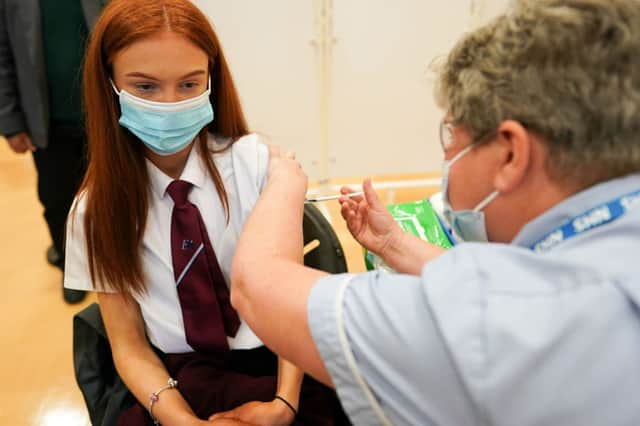Children to be offered Covid vaccine as JCVI issues new advice


Young children are to be offered the Covid-19 vaccine following new guidance issued in response to the Omicron outbreak.
The Joint Committee on Vaccination and Immunisation (JCVI) is now recommending that children aged five to 11 who are at higher risk from coronavirus should get vaccinated.
Advertisement
Hide AdAdvertisement
Hide AdThe new guidance means that five to 11 year-olds who are in a clinical risk group, or who are a household contact of someone (of any age) who is immunosuppressed, should be offered a primary course of vaccination.
A primary course should be with two 10-microgram doses of the Pfizer Covid-19 vaccine - which is a third of the adult dose.
The two jabs should be given with an interval of eight weeks between the first and second dose.
Professor Wei Shen Lim, Chair, Covid-19 immunisation, JCVI, said: “The majority of children aged five to 11 are at very low risk of serious illness due to Covid-19.
Advertisement
Hide AdAdvertisement
Hide Ad“However, some five to 11 year olds have underlying health conditions that put them at higher risk, and we advise these children to be vaccinated in the first instance.
“For children and young people who have completed a primary course of vaccination, a booster dose will provide added protection against the Omicron variant.”
Separately, in response to the threat from the Omicron variant, the JCVI has advised that booster vaccinations should be offered to people in the following groups:
- 16 to 17 year-olds
- 12 to 15 year-old who are in a clinical risk group or who are a household contact of someone (of any age) who is immunosuppressed
- 12 to 15 year-olds who are severely immunocompromised and who have had a third primary dose
The booster vaccination for people in these age groups should be a 30 microgram dose of the Pfizer vaccine.
Advertisement
Hide AdAdvertisement
Hide AdThis should be given no sooner than three months after completion of the primary course.
Covid rates among 5 to 11 year-olds ‘three times higher’
The change in guidance comes after a new study found that Covid-19 infection rates among five to 11-year-olds are three times more prevalent than in the general population.
An estimated 4.47% of primary school-aged children have the virus compared with just 1.41% across the country overall, according to the research.
REACT-1, a joint study by Imperial College London and Ipsos Mori, analysed data from 97,000 volunteers in England to examine national Covid-19 levels between 23 November and 14 December.
Advertisement
Hide AdAdvertisement
Hide AdResearchers predicted that the Omicron variant would become the dominant strain across the country more than three times faster than Delta overtook Alpha, but the speed of the vaccine rollout to secondary school-aged children, coupled with the booster rollout among adults, may have helped to curb infection rates among other age groups, researchers said.
The prevalence of Covid-19 in secondary school-aged children, previously the worst-affected age group, more than halved, while infections among the over 75s dropped by approximately two-thirds.
Professor Paul Elliott, who led the study, said: “The results reported in this round of REACT show that Omicron is spreading rapidly in England and especially in London, which now has the highest prevalence of Covid in the country.
“Compared to the Delta variant, the proportion of Omicron cases is increasingly rapidly.
Advertisement
Hide AdAdvertisement
Hide Ad“The positive news is that both the teenage vaccination and booster programmes have already shown encouraging results, with prevalence amongst 12 to 17-year-olds and those aged 65 and above dropping significantly since the beginning of November.”